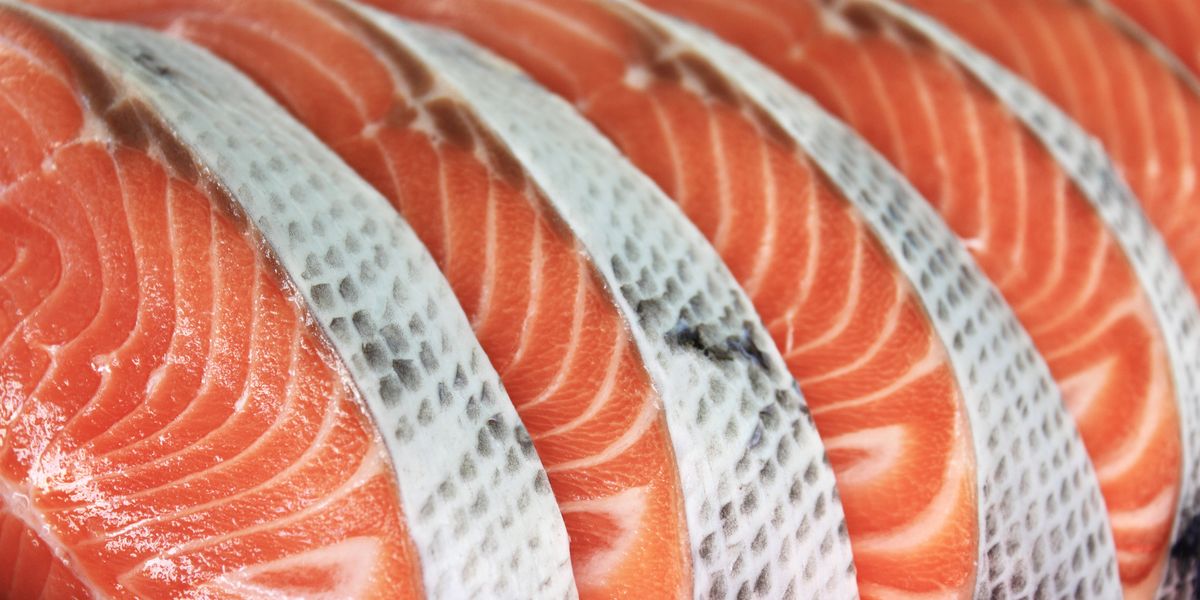
THIS IS THE HEALTHIEST WAY TO EAT SALMON
Observing Lent? Ordering sushi? Planning a Feast of the Seven Fishes menu? There’s a good chance that you're eating salmon. According to the National Oceanic and Atmospheric Administration, salmon is the second-most consumed type of seafood in the United States, behind shrimp. It can be found in waters all over the world in many varieties, making it one of the most accessible proteins.
Salmon's tender, flaky, and flavorful meat is highly versatile. You can serve it raw in sushi and poke bowls, grill it on cedar planks, or roast a whole filet with any seasoning under the sun. We’d even go so far as to say that it’s the MVP of the sea.
Depending on how you’re cooking your salmon, there’s a good chance that you might end up eating it with the skin on—or, at least, eating around the skin. Fish skin understandably makes some people a little squeamish. Depending on the way it’s prepared, it can end up flabby, chewy, and downright unpleasant.
But beyond a flavor perspective, some people avoid salmon skin for health or safety concerns. There’s the risk of polluted waters, unsanitary hatchery conditions, and concern surrounding mercury. Those red flags are always lingering, but are they something you should actually take seriously?
We chatted with Melissa Pfeister, Stanford-medicine certified nutritionist, about all things salmon skin. So next time you’re making a batch of our Tuscan butter salmon, you can rest assured that your dinner will be as healthy as it is delicious.
Is Salmon Skin Safe To Eat?
Salmon skin is definitely safe to eat. In fact, Pfeister says it’s one of the healthiest parts of the whole fish.
"Salmon skin contains the highest amount of omega-3 fatty acids, more so than the flesh, along with a hefty dose of minerals, vitamin B, and vitamin D,” she says.
The omega-3 fatty acids are especially important here. This essential nutrient plays a significant role in cell function and contribute to your overall cardiovascular health. And since our bodies don’t produce omega-3 fatty acids on their own, eating foods that have them is especially important.
"Fish having higher fat, like salmon, contain these powerful and most important omega-3 fatty acids,” Pfeister says. "These omega-3s not only help to protect you from heart disease but they also reduce blood pressure and contribute to healthier skin, hair and nails.”
How Should You Cook Salmon Skin?
The way you choose to cook your salmon can affect how healthy it is. Crispy salmon skin may be the most delicious preparation, but it comes at a cost: it diminishes some of its nutritional density. "When cooking salmon at higher temperatures, it loses some of its important vitamin D and omega-3 fats,” Pfeister says.
However, it’s worth noting that high temperatures don’t make salmon inherently unhealthy. You’ll still be able to take advantage of some of the nutrients and enjoy the crispy texture at the same time, just at lower concentrations than if the skin was cooked at a lower heat.
For those who are looking to maximize the health benefits of your fish, the oven is your friend. "Your best bet to retain the most nutrients inside the salmon is baking, keeping the skin on,” says Pfeister.
What Should You Look For When Buying Salmon?
Salmon skin comes with plenty of perks from a health standpoint. But that doesn’t mean it comes without some degree of risk. Ultimately, it all comes down to the quality of the fish you’re buying, so any health concerns are avoidable as long as you’re a smart shopper.
This applies to every type of fish, not only salmon. You want to make sure to source your seafood from reputable purveyors. It’s the best way to avoid fish that swims in contaminated water and minimize your exposure to harmful chemicals and bacteria.
On top of the safety considerations when shopping, the type salmon you choose will also have an impact on its nutrition. "The nutrients in salmon depend on the waters where they are sourced,” Pfeister says. "Wild salmon is nutritionally superior than farmed salmon, containing fewer calories, less fat and more vitamins and minerals."
2024-02-26T19:58:48Z dg43tfdfdgfd